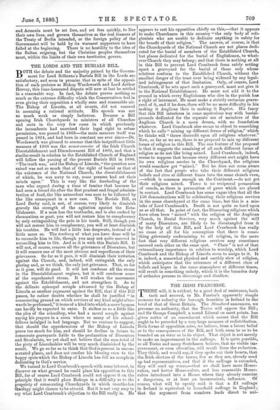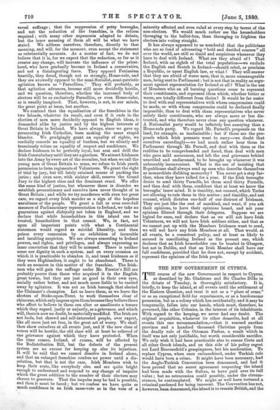THE IRISH FRANCHISE. venial suffrage ; that the suppression of
petty boroughs, and not the reduction of the franchise, is the reform required ; with many other arguments adapted to debate, but the inner meaning of them all will be what we have stated. We address ourselves, therefore, directly to that meaning, and will, for the moment, even accept the statement as substantially accurate. As a matter of fact, we do not believe that it is, for we expect that the reduction, so far as it creates any change, will increase the influence of the priest- hood, who have gradually become in Ireland a conservative, and not a disintegrating force. They opposed Fenianism heartily, they dread, though not so strongly, Home-rule, and they are avowedly opposed to the semi-Socialist, semi-patriotic agitation known as " Parnellism." They will probably, as that agitation advances, become still more decidedly hostile, and we question, therefore, whether the increased body of electors will be so exclusively Parnellite, or even Home-ruler, as is usually imagined. That, however, is not, in our minds, the great point at issue, but another.
We contend that the equalisation of the franchises in the two Islands, whatever its result, and even if it ends in the election of men more decidedly opposed to English ideas, is demanded alike by justice and by the highest interests of Great Britain in Ireland. We have always, since we gave up persecuting Irish Catholics, been making the same stupid blunder. We grudgingly grant an equality of rights, we cordially concede an equality of burdens, but we silently and tenaciously refuse an equality of respect and confidence. We declare Irishmen to be perfectly loyal, but arni and drill the Irish Constabulary until they are a garrison. We attract Irishmen into the Army by every art of the recruiter, but when we call the young men of Great Britain to arms, we refuse to Irish youth permission to form regiments of Volunteers. We grant the right of trial by jury, but till lately retained means of packing the juries ; and even now, with sinister skill, reserve the Grand Jury to the highest class and the dominant creed. We offer the same kind of justice, but whenever there is disorder we establish precautionary and coercive laws never thought of in Great Britain ; and while we try murderers with even too great care, we regard every Irish murder as a sign of the hopeless unruliness of the people. We grant a full or even over-full measure of Parliamentary representation to Ireland, we take no guarantees against disloyalty not taken in England, and we declare that while householders in this island can be trusted, householders in that cannot. We, in fact, act upon all important points with what a Continental statesman would regard as suicidal liberality, and then poison every concession by an exhibition of incurable and insulting suspicion. We are always conceding to Ireland powers, and rights, and privileges, and always expressing an inner conviction that they will be misused. There is neither sense nor dignity in such a system, and on every occasion on which it is practicable to abandon it, and treat Irishmen as if they were Highlanders, it ought to be abandoned. There is such an occasion in this matter of the franchise. The Irish- men who will gain the suffrage under Mr. Forster's Bill are probably poorer than those who acquired it in the English great towns, but they are just as good in their own eyes, socially rather better, and not much more liable to be carried away by agitators. It was not an Irish borough that elected the Claimant's champion. Let us leave them, as we leave the electors of Stoke-upon-Trent, to work themselves clear of chimeras, which only impose upon them be cause they believe those who affect to believe in them can alter or ameliorate a tenure which they regard, justly or unjustly, as a grievance, and which will, there is now no doubt, be materiallymodified. The Irish are not fools, but shrewd and self-interested people, over expert, like all races just set free, in the great art of worry. We shall then show ourselves at all events just, and if the new class of voters will be hostile, the old class will at least be relieved of one grievance against which they have protested. When the time comes, Ireland, of course, will be affected by the Redistribution Bill, but the defects of the present System are no excuse for keeping up also its injustices. It will be said that we cannot dissolve in Ireland alone, and that an enlarged franchise confers no power until a dis- solution, but that is not the case. Irish Members wish to keep their seats; like everybody else, and are quite bright enough to understand and respond to any change of impulse which the great addition to the number of their electors may chance to generate. That the impulse may be bad is possible, and then it must be faced ; but we'confess we have quite as much confidence in an Irish mass-vote as in the vote of a minority affected and even ruled at every step by terror of the non-electors. We would much rather see the householders thronging to the ballot-box, than thronging to frighten the electors into voting straight.
It has always appeared to us wonderful that the politicians who are so fond of advocating "bold and decided courses" all over the world, are still so timid and suspicious whenever they have to deal with Ireland. What are they afraid of? That Ireland, with an eighth of the total population—we exclude the English and Scotch in Ireland—should rebel, or proclaim a Republic, or upset English law, or what? They will answer that they are afraid of worse men, that is, more unmanageable men, being sent to Parliament ; but is not that in reality an argu- ment against representation for Ireland at all ? What is the use of Members who on all burning questions cease to represent their constituents, and represent ideas which, whether better or worse, are totally different from theirs ? It would be far easier to deal with real representatives with whom compromises could be made, or with whom compromise could be declared finally impossible, than to deal with sham representatives who never satisfy their constituents, who are always more or less dis- trusted, and who therefore never close any question whatever. A Nationalist party would be infinitely less annoying than a Home-rule party. We regard Mr. Parnell's proposals on the land, for example, as inadmissible ; but if those are the pro- posals which Irish peasants want to carry—we doubt that ourselves exceedingly—we had much rather hear them in Parliament through Mr. Parnell, and deal with them as the realities to be comprehended and faced, than deal with men who gave mild assurances, and left the real grievance behind unsettled and undiscussed, to be brought up whenever it was unbearably inconvenient. What is the use of insisting that Republicans shall always send up men who describe themselves as monarchists disliking monarchy? You never get a step fur- ther, when they have talked for a year. If the Irish boroughs desire to send thirty Parnells, let them send thirty Parnells, and then deal with them, confident that at least we know the boroughs' inner mind. It is timidity, not counsel, which Tories are allowing to rule them in this matter; and timidity, and not counsel, which dictates one-half of our distrust of Irishmen. They are just like the rest of mankind, and want, if you ask their opinions, to have their opinions heard, and not your opinions ffitered through their delegates. Suppose we are logical for once, and declare that as we will not have Irish Volunteers, we will not have Irish soldiers either, and that as we cannot put up with the Members Irishmen want to send, we will not have any Irish Members at all. That would, at all events, be a consistent policy, and at least as likely to succeed in conciliating Ireland as the present one, which declares that an Irish householder can be trusted in Glasgow, but not in Dublin, and that an Irish Member shall have our full confidence, provided that he does not, except by accident, represent the opinions of the Irish people.



































 Previous page
Previous page